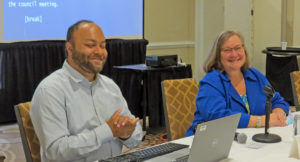
Koert Wehberg, PADDC Chair and Lisa Tesler, PADDC Executive Director
“The purpose of the Act is to assure that individuals with developmental disabilities and their families participate in the design of, and have access to, needed community services, individualized supports and other forms of assistance that promote self determination, independence, productivity, and integration and inclusion in all facets of community life through culturally competent programs.”
The federal law that approves and funds Developmental Disability Councils in each state is The Developmental Disabilities Assistance and Bill of Rights Act (DD Act). The DD Act is rooted in legislation passed by Congress and President Kennedy in 1963. Over the years, Congress reauthorized and updated the DD Act based on advocacy within the disability community and as our society gained new insight into what was possible for people with developmental disabilities. The Act changed to recognize that people with developmental disabilities have the right to control and make choices in their own lives. It came to acknowledge that people with disabilities contribute and benefit from being included in the communities where they live. Congress last reauthorized the DD Act in 2000.
Activities
Developmental Disabilities Councils have three main activities in support of individuals with developmental disabilities:
- Systems Change
- Capacity-Building and,
- Advocacy
These three primary activities anchor the work of the Pennsylvania Developmental Disabilities Council (PADDC). The law forbids PADDC to provide direct disability services and supports, other than short-term demonstration projects.
Values
Over the years, the PADDC recognized that the fulfillment of the DD Act is not only about formal disability services, programs, and supports. It developed a set of values centered on ensuring that systems available to the broader community should be made equally available, with appropriate accommodations, to Pennsylvanians with disabilities. Special programs for special people do not create needed change. Instead, PADDC’s focus is the change made possible by understanding our collective community responsibility to build a culture of inclusion and diversity. As the DD Act states, “Disability is a natural part of the human condition.”
Membership
Per federal law, the PADDC consists of twenty-three members appointed by the Governor. Members represent diverse disability interests and reflect the geographic and census makeup of the state. Sixty percent of Council Members must be people with developmental disabilities or their family members. Council has five seats for Secretaries (or their representatives) of state agencies receiving federal funds that impact people with disabilities. Those agencies for Pennsylvania include the following departments: Labor and Industry, Education, Human Services, Aging, and Health.
The Council must also have members representing Disability Rights Pennsylvania (Protection and Advocacy organization) and Temple University-Institute on Disabilities (University Center for Excellence in Developmental Disabilities). These are the two other state agencies outlined in the DD Act. The remaining members of the Council must include a representative from a non-profit and a local and non-governmental agency.
Finally, the Council has non-voting committee members appointed by its chairperson.
